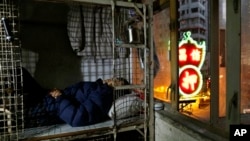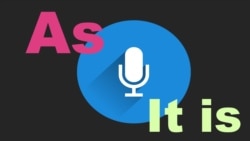The pro-democracy protests in Hong Kong are mainly about the right to vote without interference from China’s central government. That we know. But there are at least two other less talked-about issues. One is concern about the rising cost of living in Hong Kong. Another is the widening gap between the city’s rich and poor people -- or as some might say – the “haves and the have-nots.”
Many of the protesters believe political change is needed to deal with these issues. This is opposite of what Hong Kong’s top official has suggested -- that democracy would be bad for the economy.
When you think of banking in Hong Kong, you may not think about food banks -- places that give out food to needy people. But that is just what workers at Feeding Hong Kong are doing.
The Feeding Hong Kong food bank gives away enough food to make 29,000 meals a month. It helps to feed some of the one million Hong Kongers living below the poverty line.
Gabrielle Kirstein formed the group in 2009. She says Hong Kong is not dealing with issues like starvation. But she notes the number of poor people is rising.
“What we have is one in three seniors, one in four, one in five students, children that are living below the poverty line that are struggling to get three healthy nutritious meals a day.”
The poverty line marks the amount of money you need just for the basics to survive – food, clothing and shelter. Living below the poverty line means you cannot afford these necessities.
Hong Kong’s low-tax, business-friendly government has created a busy, vibrant economy. At the same time, it has also created one of the world's biggest wealth gaps between the rich and the poor.
The pro-democracy protesters have been demanding voting rights without interference from China. They have stopped traffic in the city's busy centers.
But many say there is a link between democracy and the economy. They say the lack of democracy in Hong Kong is the reason the government has not done more to help the city’s working poor and middle class.
Fernando Cheung is with the Labor Party and a member the Hong Kong Legislative Council. He questions whether the city’s chief executive can really react to the problems of increasing poverty.
“They are not even responding in the positive manner which could be traced to the very structure of the political system here in Hong Kong because after all the chief executive is not elected by the general public.”
Mr. Cheung may have a point. Leung Chun-ying is Hong Kong’s current chief executive. He has suggested that democracy in Hong Kong would give too much power to the poor. He said this on the same day the government and protesters sat down for talks to settle the current problem.
Councilman Cheung says the chief executive's comments do not reflect the interests of the people of Hong Kong. Instead, he says, the comments are more representative of Mr. Leung’s supporters in Beijing.
“They have a lot of economic interests in Hong Kong and they don't want their economic interests to be jeopardized and I think more fundamentally I think [it shows] the central government distrust (of) people.”
Most of the student protesters are not poor. But they are concerned about rising property prices and stagnant wages. Pro-democracy supporter Jenny Lau says a democratically elected government would do more to address the wealth gap.
“If Occupy Central, they made the change, I think it would make that situation better.”
But activists like her are not asking for extreme changes. They say democracy in Hong Kong could take steps to reduce the wealth gap without threatening its free market economy.
I’m Anna Matteo.
*This report was based on a story from VOA’s Brian Padden in Hong Kong. Anna Matteo adapted it for VOA Learning English. George Grow was the editor.
______________________________________________________________
Words in this Story
gap – n. when used in expresisons such as “income gap,” “generation gap” and “wealth gap”, gap means a problem caused by extreme differences between two groups
poverty line – n. the level of income that makes it possible for a person to pay for basic things like food, shelter and clothing
vibrant – adj. having or showing great life, activity, and energy
stagnant - adj. not active, changing, or progressing
Now it’s your turn to use these Words in this Story. Pick one, use it in a sentence and we will comment on your use of vocabulary and grammar. Or simply comment on the story.






